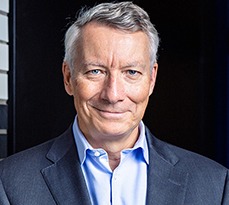

Robert Wardrop is worried about behaviour. In fact he was so worried about it that he left behind 30 years’ experience in the investment industry to return to academia, establishing the Cambridge Centre for Alternative Finance (CCAF) to look more closely at the sociology of financial decision-making. As the CCAF’s Executive Director and CJBS Research Fellow in Sociology & Finance, he has retrained as a social scientist and has brought his innovative outlook to Cambridge.
Initially, it was the behaviour around credit ratings specifically that intrigued him, or more accurately the fact that credit ratings do not reflect the motivations of underlying behaviour. As he observed before making the move from industry to academia, credit ratings are supposed to predict the likelihood of recovering loaned funds.
But, something crucial is missing. Credit scores are based on affordability, not intentionality. “Affordability measures only tell half the story because people vary in their intention,” says Wardrop. “They tell us who can afford to repay, but they don’t tell us who actually wants to repay.”
After an undergraduate business degree from Queen’s University, Canada, and an MBA from the University of Chicago, Wardrop spent 30 years advising and investing in small and medium-sized businesses. He was running a direct-lending fund when he noticed that family owners and private equity owners behaved in strikingly different ways when their businesses were in financial distress. Both were acting rationally, but within very different parameters.
“Family owners often want to retain the business, perhaps so their children can inherit it, and they’re sensitive about how they’re perceived in the community,” explains Wardrop. “I’ve even seen family business owners write payroll cheques from their personal funds. A private equity owner would simply never do that.” What struck him, he says, was that these business owners typically had very similar credit ratings at the start of their loans. “But we saw that financial stress could produce very different behaviour that could influence whether or not the funds were repaid.”
Credit ratings were not capturing this difference. Wardrop had exposed a fundamental flaw in the scoring system: the behavioural dimension, as influenced by social relationships, was missing. The smaller the firm, the greater the importance of analysing borrower intentions, and therefore the less fit-for-purpose the traditional method of rating credit would be. “I had found something that really intrigued me,” he says. “It was a puzzle I wanted to figure out.”
It was this interest in intentionality that inspired him to return to academia. “I’d had a successful career, so I thought: what am I going to do next? I had these observations that, in my opinion, very much diverged from orthodox finance theory and current thinking about decision-making.” So he decided to go back to academia and give those observations explanatory power.
“My intention was always to apply sociology to finance,” says Wardrop, whose academic research interests include alternative forms of finance for SME and middle market firms and the sociology of financial decision-making. “I joined the Finance & Accounting subject group soon after arriving, and that led to me proposing the creation of the Cambridge Centre for Alternative Finance (CCAF).”
CCAF was founded in January 2015. It is the first such centre to open worldwide and it was needed, says Wardrop, because we are in a period of structural change, not cyclical change. “The changes that are underway in the banking system and the way in which finance is provisioned are permanent.”
Given that alternative finance is a social phenomenon driven by technological change, it was crucial for the centre to be interdisciplinary in nature. “If you look at this only in terms of quantitative finance, or only in terms of technology, then you simply won’t get it.”
Wardrop has also lived in Paris, Amsterdam, Brussels and New York. He says he felt at home in Cambridge straight away. “It’s really quite a special place. I was surprised by just how accessible people are in other departments and disciplines if you approach them in a collaborative way.” The father-of-three (one son, two daughters) still spends a generous portion of time in the French mountains and counts cycling and skiing, especially ski-touring, among his favourite pastimes. He also has non-executive roles on a number of boards.
His doctoral research examines the phenomenon of mini-bonds: bonds issued by small and medium-sized companies directly to individual investors. He asks why they have been issued in a much larger volume in Germany than in the UK since the financial crisis. “The explanation is partly because German small- and medium-sized firms, known collectively as the Mittelstand, are deeply trusted by their communities, so the average person in Germany is much more willing to lend to them. By contrast, the average UK investor does not have a similar level of trust in small and medium-sized UK firms.”
“Alternative credit analytics are emerging that use new forms of data, such as Reddit’s system of Internet karma points,” he continues. “The banks have no advantage as incumbents. They may even be at a disadvantage if these new forms of lending are producing high levels of predictive power. Maybe the new guys will reach the point where they can assess credit better than the existing banks and so will turn the whole system upside down.”
To date, CCAF’s research has been cited by the Ministries of Finance in Germany and Finland, the European Commission and multiple branches of the UK government. “This evidences a need for either legislative change or additional research work in deeper areas, within or on behalf of policy makers,” says Wardrop, whose immediate career goals are to finish his PhD and to build on CCAF’s initial successes. “This has probably been the most satisfying professional thing I’ve ever done – and I say that after 30 years in industry.”

